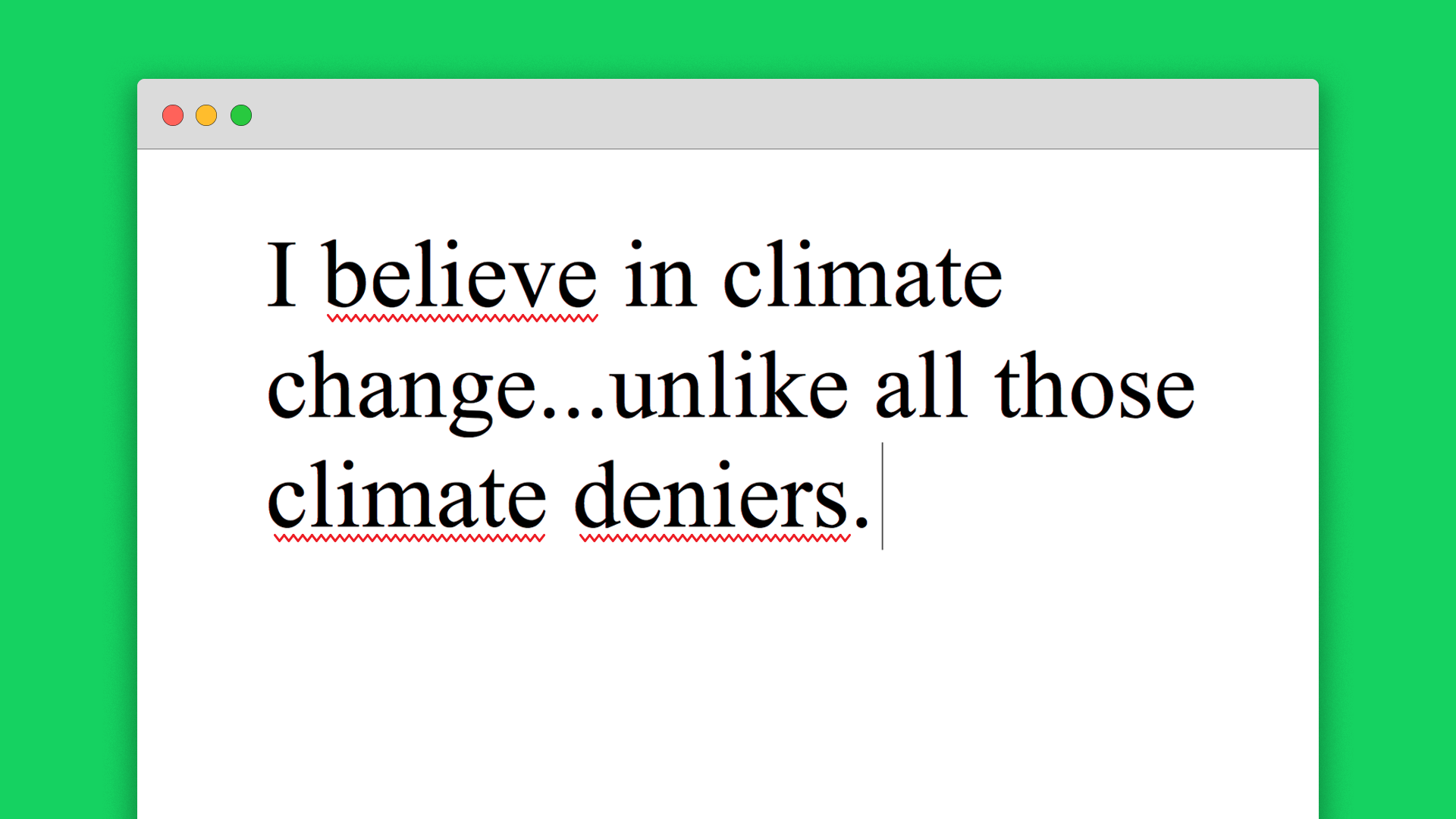An energy and climate glossary for Trump (and everyone)
Add Axios as your preferred source to
see more of our stories on Google.

Illustration: Rebecca Zisser / Axios
President Trump’s recent comments on energy and climate change have been, well, imprecise. Here’s a handy glossary to make sure everyone’s got their semantics straight.
Why it matters: Because words matter! Especially sloppy ones in an amped-up media landscape where many don’t look past headlines. It’s important to get this stuff right when extreme voices are louder than ever and the president openly doubts mainstream science.
Global warming and climate change
“It used to be global warming,” Trump said in a recent interview with Piers Morgan. “That wasn’t working too well, because it was getting too cold all over the place.”
To be clear, he got his facts wrong, but let’s unpack what he meant by his words.
The Washington Post has a nice explanation of the evolution from global warming to climate change to what we have today: a mix of the two. Trump is right that the terms have evolved, but not because of the reasons he cited.
- GOP polling in 2002 said climate change was preferred over global warming to illustrate a less scary phenomenon.
- In 2005, the National Academies of Science issued a memo suggesting climate change was growing in preference because “it helps convey that there are changes in addition to rising temperatures.”
The terms cut both ways, climate scientists say.
“The argument that global warming is a bad term because sometimes the weather isn’t warm, that’s fine,” said Anthony Leiserowitz, a climate scientist and communicator at Yale University. “But it’s also true that when you use the term climate change, the deniers can come back and say the climate has always changed.” Trump did that in a tweet during a December cold snap.
My preference is to use climate change — and always make clear that human activity is driving it.
Believing in climate change
Climate change isn’t a religion, or anything else people choose to believe or not believe. It’s a science backed up by data and evidence. A better word: acknowledge.
Climate denier and climate skeptic
These two terms are used, largely by climate activists but some news outlets too, to describe people who question or reject mainstream climate science.
People labeled deniers claim they’re being wrongly lumped in with people who deny the Holocaust happened. Climate change is not in the same category as the Holocaust, and bringing that into this debate is unhelpful to say the least.
A better way: avoid personifying labels. It takes a few more words, but it’s more accurate and less polarizing. Here's what I say about President Trump and EPA administrator Scott Pruitt: They don’t publicly acknowledge the mainstream scientific consensus that human activity is driving the Earth’s aggregate temperature up.
Alternative energy vs. conventional energy
Alternative energy is a term generally known to represent any energy that’s not fossil fuels: oil, natural gas or coal. Conventional energy is considered fossil fuels. Those two words — alternative and conventional — reinforce stereotypes by implying one is always the alternative to the conventional.
A better way: Say renewable instead of alternative (or specify precisely what type of energy), and say fossil fuels instead of conventional.
Clean energy, green energy
Is it just renewables, like wind, solar and hydropower? Is it energy that doesn’t emit carbon emissions? Is it everything but coal, like this Washington lobbying coalition described it? The term is ambiguous and politically expedient. A better way: Specify the energy type.
Coal vs. clean coal
“We have ended the war on beautiful clean coal,” Trump said at his State of the Union last week. That’s not true from a factual standpoint, but his words are also misleading. Coal, historically the world’s dominant and cheapest source of electricity, is a fossil fuel that emits the most traditional air pollutants, like nitrogen oxide, and carbon emissions.
Clean coal is a term some use as shorthand to describe technology that allows facilities to capture and store carbon at facilities like a coal plant instead of emitting it into the air. But Trump never talks about that technology. Instead, he appears to use “clean coal” to describe plain coal, which is wrong and disingenuous.
Fracking, hydraulic fracturing, horizontal drilling
Fracking, short for hydraulic fracturing, is a controversial technique that’s often paired with horizontal drilling, to extract vast reserves of oil and natural gas from deep rock formations in places like North Dakota and Pennsylvania.
The media, myself included sometimes, environmentalists and others have used the word fracking to encompass the entire extraction process. It is the catchiest word, but fracking is just one part.
Windmills vs. wind turbines
The former is often a term critics of wind energy, including Trump, use to paint an inaccurate image in people’s minds. Wind turbines that generate electricity are huge and don’t look anything like an image that possibly popped into your mind: windmills in the Netherlands.
To be clear, my assessment here contradicts the dictionary, which does say windmills can generate power. We shouldn’t look to Merriam-Webster for the most accurate energy lingo.
What did I miss? This isn’t comprehensive. I started with these terms because of their timeliness. Email me at [email protected] for more ideas for another installment someday sooner or later.
